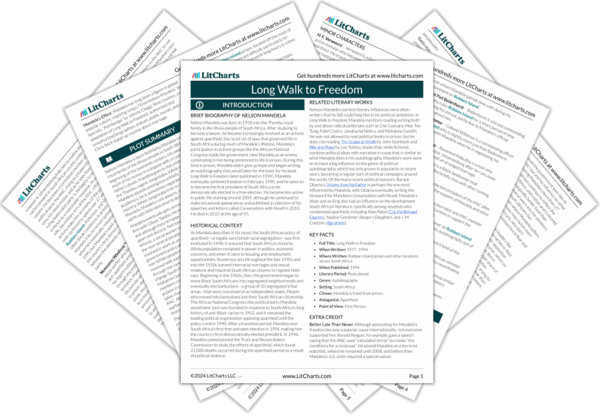Even at the darkest moments of his life, like during his more than 27 years in prison at Robben Island, Pollsmoor, and Victor Verster, Nelson Mandela maintained a sense of optimism, calling himself “fundamentally an optimist.” As Mandela makes clear in his autobiography, it’s possible to be optimistic even while acknowledging the problems and injustices of the world. In fact, Mandela believes that being optimistic is an essential part of his liberation struggle, and that optimism is what keeps him from being defeated by despair. Mandela believes that the only way to properly prepare for a better future is to believe that it’s possible for one to exist, and so while he’s in prison, he always busies himself under the assumption that he will one day be released. One of the most important activities is writing an autobiography—a draft of the very same manuscript that will eventually become Long Walk to Freedom. The autobiography is useless to Mandela in prison—if discovered, the guards will simply throw it away and no one will ever see it. But Mandela arranges to smuggle the manuscript out of prison. This suggests that he believes both that he will one day be out of prison, and that future generations of people will be interested enough in his life and work to read a book about him.
As it turns out, while not all of Mandela’s wishes came true in his lifetime, his optimism is generally proven correct after he gets released from prison. It’s in this post-prison segment of the autobiography that the value of Mandela’s previous optimism becomes apparent. Because Mandela spent so much of his prison sentence studying important topics, keeping his body physically fit, and keeping up to date on current news, he emerges from prison in a condition to lead his country. Mandela’s autobiography thus argues that optimism is valuable because it offers people hope, but also because it can become a self-fulfilling prophecy. That is, people who remain optimistic in times of trouble often deal with those difficult times better and emerge with the strength to build a better future that lives up to their optimistic worldview.
The Value of Optimism ThemeTracker

The Value of Optimism Quotes in Long Walk to Freedom
Apart from life, a strong constitution, and an abiding connection to the Thembu royal house, the only thing my father bestowed upon me at birth was a name, Rolihlahla. In Xhosa, Rolihlahla literally means “pulling the branch of a tree,” but its colloquial meaning more accurately would be “troublemaker.” I do not believe that names are destiny or that my father somehow divined my future, but in later years, friends and relatives would ascribe to my birth name the many storms I have both caused and weathered. My more familiar English or Christian name was not given to me until my first day of school.
Her name was Nomzamo Winifred Madikizela, but she was known as Winnie. She had recently completed her studies at the Jan Hofmeyr School of Social Work in Johannesburg and was working as the first black female social worker at Baragwanath Hospital. At the time I paid little attention to her background or legal problem, for something in me was deeply stirred by her presence. I was thinking more of how I could ask her out than how our firm would handle her case. I cannot say for certain if there is such a thing as love at first sight, but I do know that the moment I first glimpsed Winnie Nomzamo, I knew that I wanted to have her as my wife.
I was prepared for the death penalty. To be truly prepared for something, one must actually expect it. One cannot be prepared for something while secretly believing it will not happen. We were all prepared, not because we were brave but because we were realistic. I thought of the line from Shakespeare: “Be absolute for death; for either death or life shall be the sweeter.”
One day, Kathy, Walter, and myself were talking in the courtyard when they suggested that I ought to write my memoirs. Kathy noted that the perfect time for such a book to be published would be on my sixtieth birthday. Walter said that such a story, if told truly and fairly, would serve to remind people of what we had fought and were still fighting for. He added that it could become a source of inspiration for young freedom fighters. The idea appealed to me, and during a subsequent discussion, I agreed to go ahead.
I have walked that long road to freedom. I have tried not to falter; I have made missteps along the way. But I have discovered the secret that after climbing a great hill, one only finds that there are many more hills to climb. I have taken a moment here to rest, to steal a view of the glorious vista that surrounds me, to look back on the distance I have come. But I can rest only for a moment, for with freedom come responsibilities, and I dare not linger, for my long walk is not yet ended.











